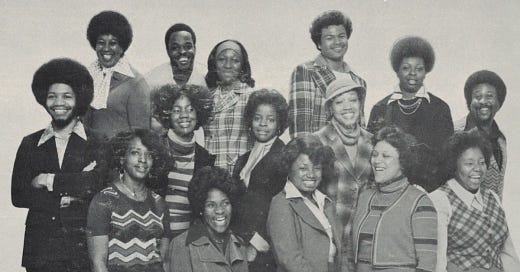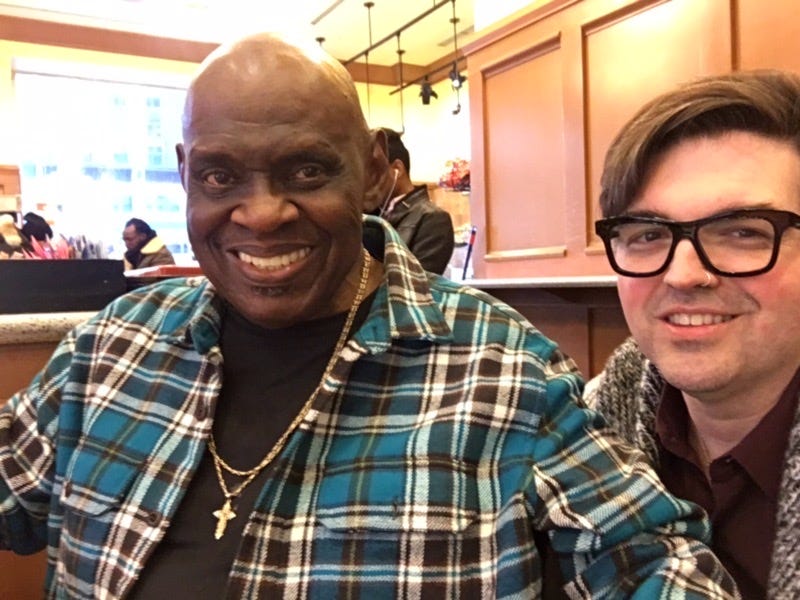Express Yourself In Me: The Book In Motion
Your support today goes directly to completing the biography of the New York Community Choir!
Back in the summer of 2012, I was on the phone with my good friend, the late Daryl Coley, talking about older music, something we discussed often. Daryl was as much a historian as he was an artist, a fan of everyone from the Norman Luboff Singers to Gloria Lynne to Barbra Streisand to the Benny Cummings Singers. “Boo, have you ever heard the New York Community Choir?” he asked. I told him that I had not—I was born just a few years too late to have heard them on the radio in the prime of their career.
He regaled me with stories about Rev. Isaac Douglas, one of the group’s co-founders and suggested that I start looking for them in my jaunts to record stores. I ventured over to YouTube and heard their 1972 recording, “Let’s Go Higher,'“ led by another co-founder, Arthur Freeman along with Rev. Douglas, and I was hooked. They fascinated me because they were different. I recognized something in their sound that reminded me of the Holiness Church that I landed in at 14 years old.
We had a sound at New Covenant Holiness Church that set us apart from the other churches in our area. I was too young to understand all of the dynamics of why, but retrospectively, I do. We were called “the loose church” by the other Sanctified churches nearby. Our pastor left the Fire Baptized denomination because he wanted divorced women (like his daughter) to be able to preach. He wanted to do away with the aesthetic restrictions (no make up, no jewelry, etc.) and let people be free. While we were marked as “loose” by the community, we were also the choir they called when they needed a particular kind of fire at their programs. I know now that our difference, our inability to abide by the norms, translated into our sound. And that sound, consciously or unconsciously, set people free—if only for a moment.
Our outlook—one that refused to be so heavenly minded that we were no earthly good—made people connect with us differently. While other churches put on the airs of holiness, we had—shall we say—a flesh/spirit balance that made us a congregation where people could be real. We were the place people came knowing they could be honest about what they were going through. It made our testimony services an open and safe space for the whosoever-wills to sing, scream, cry, confess, praise and exorcize their way out. That experience forever changed me and convinced me of the power that is possible when two or three can touch, agree and come together in song. That power really can move mountains.
That was the same power and belief system I heard in the New York Community Choir the first time I heard them. I had no evidence that it was their truth, but it permeated their music. I longed to know the story underneath that. So in 2014, I began working on what was, at the time, my undergraduate honors thesis for the Africana Studies program at University at Albany. I sought out and found the two surviving co-founders of the choir (Bennie Diggs and Arthur Freeman) as well as other members of the group which started me on a journey that I did not expect to be on all of these years later.
I learned that what I’d heard in the music was accurate. They were a step beyond the freedom we had at New Covenant and it was a gift to be welcomed into their story. I finished my 120-page thesis (and was awarded UAlbany’s Undergraduate Research Award), but knew that the story wasn’t finished with me—it was determined to live in a book, a book-in-process which I’ve titled Express Yourself In Me: Black Power, Gay Liberation and Disco Heat with a Holy Ghost Touch.
A Holy Ghost Touch is an important part of the title to expand on.
I have learned many things about the choir and their foundation since I finished my thesis in 2018. The core of the choir was under the tutelage of Archbishop William Morris O’Neil (he would later add an '“e” and become O’Neile), who has come to occupy a lot of space in the story. His Christian Tabernacle in Harlem (founded in the early 1950s) was an ahead of its time (but right on time) place that was a refuge both for those who lived on the fringes of society and those who were the toast of Black New York’s political and creative worlds. Women, gay and trans people, in particular, were embraced and utilized both as lay members and in ministry—not just tolerated. O’Neil’s moniker in his nearly forty years of ministry (extending to Universal Tabernacle, his later work in Los Angeles) was “Spiritual Truth with a Holy Ghost Touch.” His spiritual and musical descendants brought both to the movements and cultures they moved through.
The New York Community Choir’s body of work, which began in 1970, is an important representation of a progressive theology that the church is still resisting. While they are important contributors to the evolution of contemporary gospel music (alongside Andraé Crouch and The Hawkins Family), it is their ideological and theological work that deserves to be equally recognized. The conversations that are so prevalent today around New Thought theology, affirming churches and the dogged separation of the sacred and the secular were all issues that the New York Community Choir was navigating and addressing both passively and aggressively, in their work. Their visionary approach came with a price in terms of their acceptance in gospel circles and, in the long-term, the acknowledgment of their work by gospel music’s gatekeepers. This is one of the many reasons they matter.
The choir’s web of connections is vast—it encompasses Archbishop Carl Bean, James Cleveland, Nikki Giovanni, the Sweet Inspirations, Nashville’s Shannon Williams and Nashboro Records, Melba Moore, Vicki Sue Robinson, the Bee Gees, Labelle, Luther Vandross, Coko from SWV, Rev. Troy Perry (founder of the Metropolitan Community Church), Tramaine Hawkins and so many others. NYCC were unafraid to take gospel music into “the world.” They understood that “the world” was the place their freedom call was needed most. Their courage, determination, and lack of ego (another reason their story isn’t more known) have inspired me.
In his last days in 2020, the late Arthur Freeman, asked me to make sure that their story would be told and I have never stopped working on it. I owe many thanks to Bennie Diggs, co-founder and director of the choir, for the countless conversations over the last eight years and his confidence, encouragement, and affirmation of the vision for this book.
I have recognized, however, that to finish this book, I need a radical reorganization of my life. This past week, I rolled out a GoFundMe to assist with this effort.
For the last three years, I have focused on building my professional profile by increasing my social media presence, launching this Substack newsletter which has introduced thousands of readers to my writing. My intention in creating the newsletter was NOT to monetize my writing, but to make my articles available to the public for free so that everyone can access the history without being nickel and dimed to death.
I have also hosted the interview web series Have You Ever Heard, launched the Outlaw’s Evidence of the Unseen podcast with Ray Curenton, written liner notes for a handful of reissue projects and compilations of gospel and soul music, and taken the Editorial Content Manager seat at SoulMusic.com. I have done all of this in addition to maintaining a demanding full-time job.
It has become obvious to me that I have run out of hours in the day and I cannot live on the amount of coffee that has helped me get this much work done.
I have two additional book collaborations (co-writing opportunities) in my queue, but I am clear that my commitment to the New York Community Choir project must be completed before I go any further.
I need to take a leave of absence from my job to finish this massive project. A work like this requires focused hours of concentration and I simply, at this moment, do not have those hours at my disposal. In addition to this GoFundMe, I will be applying for grants and searching for donors who will match this goal—which is why it's essential to meet it. Every donor’s name will be listed in the book when it is completed.
These funds will, indeed, help cover my living expenses (currently covered by my job), but they will also cover research trips to New York and Los Angeles, the costs of photo and song licensing (the latter required to include song lyrics—and they are pricey!) for usage in the book, an editor and an indexer.
I have secured newyorkcommunitychoir.com (which went live this past week!) and am working with Bennie Diggs to make the website an active archive of the choir's history with photos and documents from Bennie’s personal collection. The funds I raise will also help make this effort possible.
I have been assured that a book of this nature will not draw the kind of advance from a publisher that would come close to the amount of money required to actually complete it–-but that doesn’t mean that the work doesn’t have value or have significance in the world.
I am asking my friends, family, supporters/subscribers—even those who do not have an appreciation or understanding of gospel music—to support me in completing this labor of love that I was, indeed, called to. In these times, it is essential to rely on our communities to help us complete the great commissions that we are each tasked with accomplishing. If you don’t know me, but love gospel music and want to see its untold stories raised, I ask for your assistance in completing Express Yourself In Me: Black Power, Gay Liberation and Disco Heat with a Holy Ghost Touch.
I am forever indebted to you for your support.






Great post. I love this: "[we] refused to be so heavenly minded that we were no earthly good." Yes. Your story/ies is/are gospel! I came home to post on my page. Thanks for tagging me. I testified in the comment section.